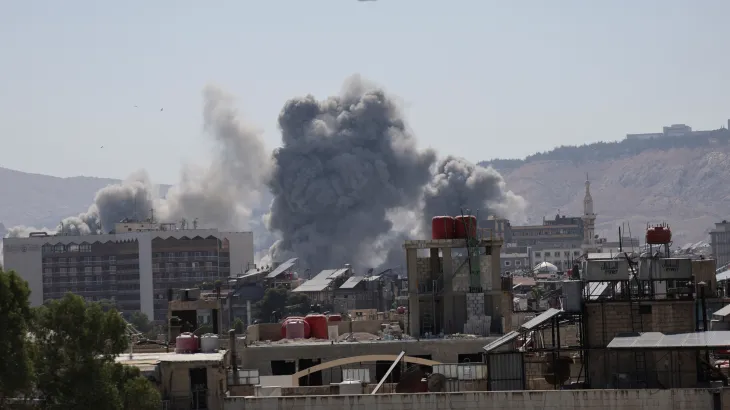Why Is Israel Bombing Syria to Protect the Druze? | Sectarian Violence, Geopolitics, and the Future of the Middle East
A new wave of sectarian violence in Syria has brought the Druze minority into the global spotlight. Amid clashes in Suwayda and intensifying tensions with Israel, the region is once again a focal point of Middle Eastern instability. Israel claims to be acting in defense of the Druze, an Arab religious group with deep ties to its own population, but its military strikes are complicating relations with Syria and drawing criticism from global powers, including the United States.
What Sparked the Latest Violence in Syria?
Earlier this week, deadly clashes erupted in the southern Syrian city of Suwayda, a historical stronghold of the Druze community. Violence between Druze militias and pro-government Bedouin tribes resulted in at least 30 deaths and dozens of injuries. In response, Syrian military forces entered the city, further escalating tensions.
Adding fuel to the fire, Islamist factions allied with the Syrian government reportedly joined the conflict, prompting prominent Druze leaders to demand international protection.
Israel’s Military Response: Protecting the Druze or Projecting Power?
Israel launched airstrikes on Syrian military vehicles advancing near Suwayda, stating it was acting to protect the Druze community. The Israeli Defense Forces (IDF) also struck near Syria’s military headquarters in Damascus. Israeli Prime Minister Benjamin Netanyahu framed the attacks as part of a “brotherly alliance” with the Druze—130,000 of whom live in northern Israel and serve in its military.
However, the Syrian Foreign Ministry condemned the strikes, calling them a “blatant violation of sovereignty” and accusing Israel of foreign interference.
U.S. Reaction: Caught in the Crossfire
The United States, Israel’s closest ally, expressed serious concern. Tom Barrack, the U.S. special envoy for Syria, described the situation as “worrisome” and urged Israel to halt its air campaign. U.S. officials reportedly secured a promise from Israel to pause strikes—though this was short-lived. Israeli Defense Minister Israel Katz later warned of intensified attacks if Syrian forces do not withdraw from Suwayda.
Who Are the Druze and Why Are They Significant?
The Druze are a secretive Arab ethnoreligious group numbering around one million globally, concentrated in Syria, Lebanon, and Israel. Originating in 11th-century Egypt, their faith is rooted in Islam but incorporates unique philosophical beliefs and prohibits conversion.
In southern Syria’s Suwayda province, the Druze have historically navigated a difficult position between the Assad regime and radical Islamist groups. Many Druze living in Israel’s Golan Heights—territory seized from Syria in 1967—identify as Syrian and rejected Israeli citizenship, despite being granted residency.
A New Syrian Government, Old Problems
Since the overthrow of Bashar al-Assad in late 2024, Syria has been governed by Ahmed al-Sharaa, an Islamist with a history of jihadist affiliations. Despite promising inclusion and unity, al-Sharaa’s administration has been accused of marginalizing religious minorities, including the Druze.
Key tensions include:
- Forced disarmament of Druze militias
- Exclusion from national dialogue
- Lack of representation in the new government (only one Druze minister)
Clashes in Suwayda and past crackdowns in cities like Latakia have raised alarms among minority groups fearful of marginalization or worse.
The Druze Dilemma: Divided Opinions on Syria and Israel
The Druze community remains deeply divided. Spiritual leader Hikmat Al-Hijri called for international intervention to stop what he described as a “war of extermination.” Others welcomed the Syrian government’s involvement and encouraged dialogue.
These divisions underscore the complex identity politics surrounding the Druze—tied by ethnicity and religion, yet divided by geography and politics.
Can Israel and Syria Normalize Relations Amid Bombings?
Ironically, while bombs fall in Syria, Israel and the new Syrian regime have reportedly engaged in indirect talks about normalization—possibly through the Abraham Accords, the U.S.-brokered peace deals between Israel and Arab nations.
In May 2025:
- President Donald Trump lifted sanctions on Syria
- Syria’s leader met with U.S. officials in Riyadh
- Israeli officials expressed a desire to expand normalization to Syria and Lebanon
But Israeli airstrikes have complicated these efforts. Syrian President al-Sharaa has insisted that normalization must come with a halt to Israel’s military actions. Netanyahu, on the other hand, maintains a hardline stance, calling Syria’s new leadership an “extremist Islamic regime.”
Strategic Interests in Suwayda and Southern Syria
Israel’s insistence on a “demilitarization zone” in southern Syria reveals deeper geopolitical motives. The region borders Israel’s Golan Heights, and Israeli officials fear a resurgence of Iranian-backed militancy or jihadist groups.
By keeping southern Syria fragmented and unstable, Israel may aim to create a buffer zone, even as it publicly frames its strikes as humanitarian efforts to protect the Druze.
Conclusion: Sectarian Tensions with Global Consequences
The conflict in Suwayda is more than a sectarian flare-up—it is a microcosm of the complex geopolitical rivalries reshaping the Middle East. Israel’s involvement is driven by both security concerns and domestic alliances with its own Druze citizens. Syria’s new regime is attempting to centralize power while navigating international diplomacy, and the U.S. is struggling to balance support for Israel with long-term regional stability.
Whether this crisis evolves into a larger conflict or serves as a prelude to a new regional order will depend on the next moves from Tel Aviv, Damascus, and Washington.



